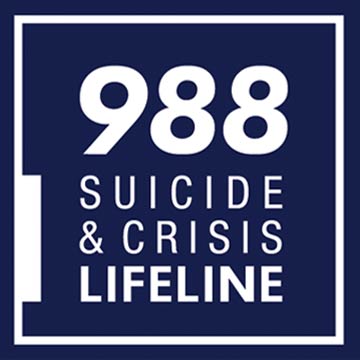Suicide Loss Support: You are not Alone
TAPS has supported tens of thousands of military suicide loss survivors by offering hope and connection. If you’ve lost a family member, loved one, colleague, friend, or battle buddy to suicide (either during or after their service) you have found a safe place with us. We understand that suicide grief is different and has a range of complex issues, emotions, and questions. You are not alone on this journey. We are fellow suicide loss survivors who have been traveling the pathway of grief and are here to offer support. TAPS has developed resources and programming that provide compassionate care through our very own field-leading, best-practice approach to suicide postvention that helps with immediate stabilization, support with processing grief, and opportunities for healing and growth.
![]()
You are not alone.
Grief can feel isolating, but you don't have to walk this journey alone. We've been down the road you're traveling, and we're here for you.
![]()
You will not always feel this much pain.
As time passes and with postvention support and care, the hurt you feel now can evolve and change. The intense, all-consuming emotional pain will not always feel like it does right now, and can ease and soften with grief work and passing of time.
![]()
Most people who die by suicide do not want to die; they want to end the pain and cannot see any other option.
Whatever pain brought our loved ones to end their lives, it inhibited them from thinking clearly and from fully comprehending the heartbreak their suicides would cause.
![]()
It's not your fault.
Suicide is rarely the result of a singular issue, interaction, conversation, or contributor. It usually involves multiple, complex factors that culminate in a devastating event.
![]()
You cannot prevent what you cannot predict.
There was no way you could have known exactly what would happen at a precise moment in time. We cannot control the thoughts or actions of others.
![]()
Eventually, the questions can ease from being so all-encompassing.
"Why?" "What if?" Most of us who have experienced suicide loss wrestle with endless questions. This is normal, and over time, can help process our thoughts so that we can eventually find healing and understanding.
![]()
What you tell yourself matters.
How you talk to yourself about what happened can shape the experience of your grief journey. You deserve to be supported and to create your story in going forward that best helps you heal on a hopeful path towards your future.
![]()
Suicide is not a reflection of love.
People who die by suicide are in pain and often believed they are a burden. They may have thought that others would be better off without them. We know this to be untrue, but our loved ones likely could not see clearly through the fog of their emotional pain.
![]()
How you cope with this is up to you.
You didn't choose for this to happen to you, but you do get to decide how to respond to it. You have control in how you choose to heal.
![]()
Love never ends.
When your loved one died, the love didn't just stop. Your relationship with them can continue. You can keep the positive memories alive in your own life and actions.
For survivors in need of immediate suicide postvention support, please contact us at 800-959-8277.
TAPS Suicide
Prevention & Postvention
Suicide Prevention
Social Media Toolkit
Resources for
Suicide Loss Survivors
Using safe messaging when we talk and post about suicide makes a world of difference, reinforces hope, and ultimately, saves lives.
Listen to surviving dad Frank Larkin share lessons learned on the lookback in an effort to save lives in honor of his son, Ryan.
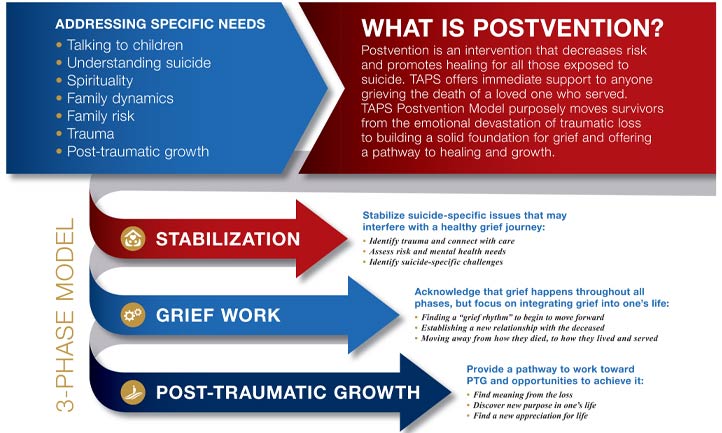
TAPS has published a peer-reviewed article in the field-leading scholarly journal Death Studies. Read “TAPS Suicide Postvention ModelTM: A Comprehensive Framework of Healing and Growth" to learn about our three-phase approach to care that is beneficial to both survivors and providers in the aftermath of a death by suicide. This document is the culmination of a more than decade of care to thousands of survivors of military and veteran suicide loss.
Our Programs and Services
Death is not the defining feature of a life. On the contrary. TAPS has created special resources and programming that provide compassionate care to survivors so they can best honor their loved one’s entire story.

Survivor Care Team
TAPS staff, who are trained and caring survivors, reach out to new surviving family members as peer professionals. These trained and caring survivors understand well the road you are traveling. They are available around the clock to help.
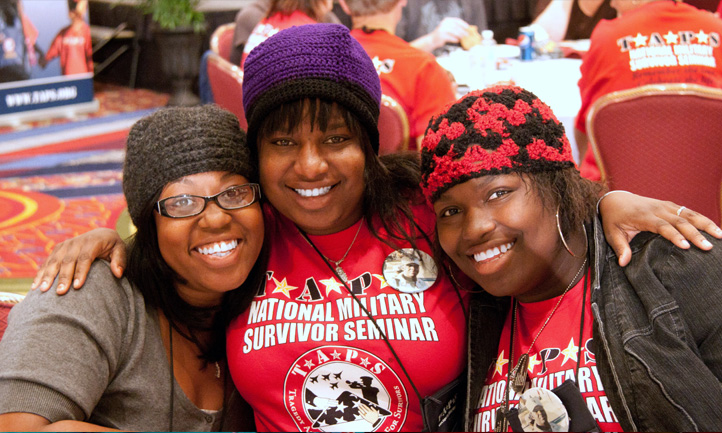
Peer Mentor Program
Suicide loss survivors are paired with peer mentors who have themselves experienced a loss due to suicide. Our peer mentors are there to listen when you need someone to talk to, to be a friend when you're feeling lonely, and to celebrate the triumphs.
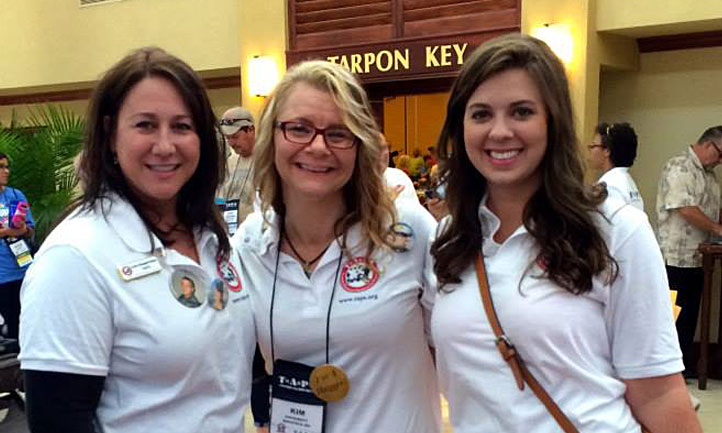
Connect Online
TAPS hosts a live online chat the 2nd and 3rd Mondays of each month for just suicide loss survivors that is moderated by our suicide survivor staff members, as well as other ways to stay connected virtually. Join us to learn more.

Casework
TAPS Casework Advocates provide compassionate and responsive support in navigating issues regarding military survivor benefits and finances. We help point you on the path to long-term stability.
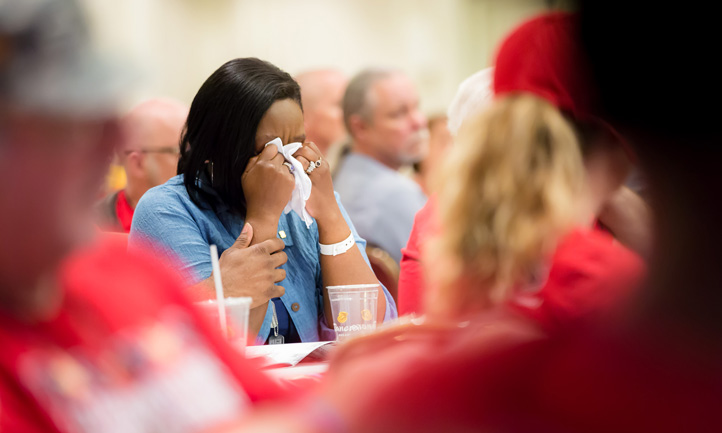
Grief Counseling
At TAPS, we rely on a large network of strong community partners, and we are confident we can connect you with grief and trauma resources specific to your needs.

Education Assistance
Our education support coordinators can help explain benefits, identify scholarships, work with you to align resources and education goals, and provide talking points to schools, colleges, and universities.
« Back
We Invite You...
to access some of our most important resources to address the unique needs related to suicide loss. Additional resources are available in the TAPS Suicide Postvention Document Library.

How to Talk to Children About Suicide Loss
Telling a child about suicide can be daunting. Read some suggestions to help you navigate this difficult subject.
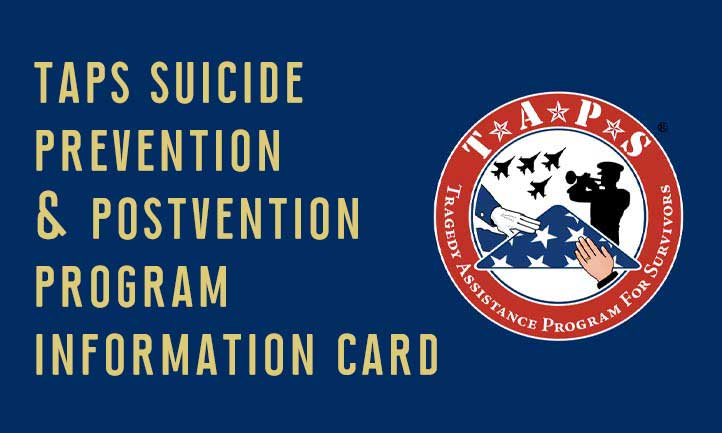
TAPS Suicide Postvention Information Card
Describes what suicide postvention is along with helpful information you should know now.
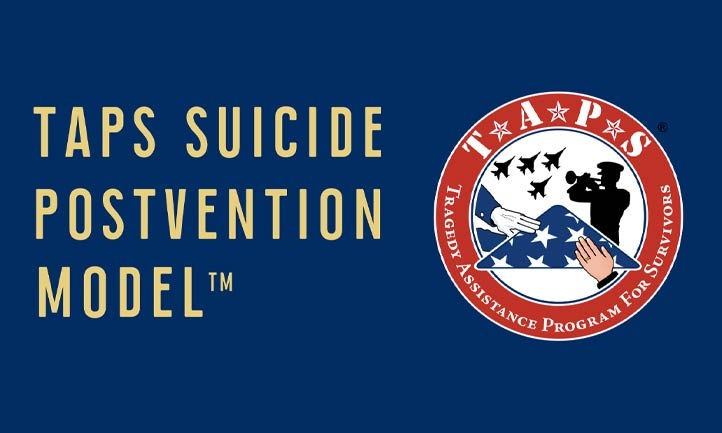
TAPS Suicide Postvention Model TM
This three-phase model is a best-practice approach to postvention care for survivors of suicide loss.

From Grief to Growth: Healing After a Suicide Loss Guidebook
This guide was written by survivors to help you on your journey of grief.
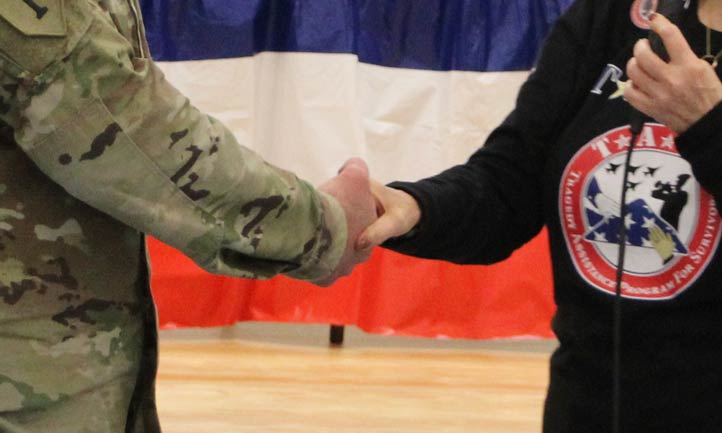
Postvention Stabilization for Military
Learn responses to establish safety, decrease risk, and promote healing among all those exposed to suicide.

Safe Messaging Guide: Talking about Suicide
Words matter. How we talk about suicide and share stories about related topics has an influence on those around us.
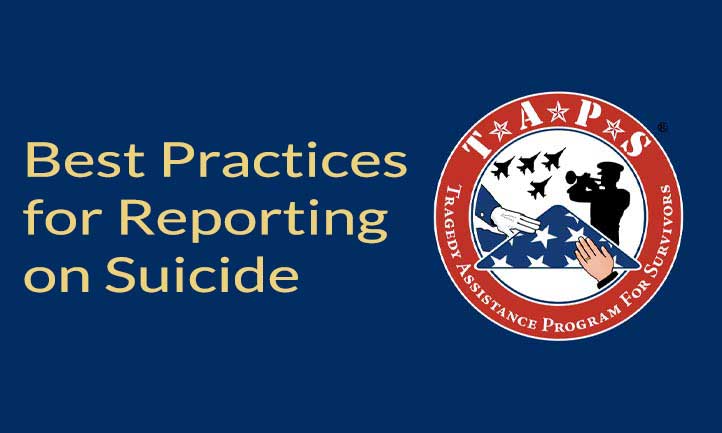
Best Practices Reporting on Suicide
How the media depicts suicide and shares stories about related topics can influence the behaviors of the general public.

Safety Plan Worksheet
Be prepared in a crisis. Make your emergency plan to respond and assist someone in need. Download and complete this worksheet today .
If you are looking to find support (not military-oriented) after suicide loss in your family, here are some helpful tips on how:
-
Do an online search (on Google, etc) for phrases such as:
- suicide survivor support near me
- grief support after suicide loss
- help for after a suicide
- suicide grief
- suicide loss
- survivors of suicide loss
This should bring up a mix of national and local resources such as websites, state programs, local organizations and lists of support groups for suicide loss survivors that meet in your area.
If you are looking for a specific type of support, such as for children or siblings of someone who died by suicide, add those words into your Google search.
-
Find books on suicide loss at your local library or bookstore. Searching by some of the above terms and phrases should bring up books about suicide loss; they may be located in a “self-help” or psychology section of your bookstore or library.
-
If you see or have contact with a mental health professional, such as a counselor, therapist or social worker, ask if they can refer you to suicide grief-specific support in your area. You can also ask your faith leader if they know of any such supports in your community.
-
You can also check your state’s government website for information on support in your community. Support for suicide loss survivors may fall under your state’s public health or mental health departments; these websites may list information regarding local supports and initiatives regarding survivors.
Also, many states have suicide prevention coalitions (state-wide or even broken down into smaller geographic areas of the state) that can offer resources and other ways to get involved in their initiatives, such as around policy advocacy and state funding for programs.
NOTE: The TAPS website is not intended as an intervention for those who may be in crisis. If you or someone you know are experiencing behaviors or thoughts of suicide, help is available. Please contact the National Suicide Prevention Lifeline toll-free at 988.
For All Survivors
Online Communities
See additional resources on mental health, suicide prevention and postvention.
« Back
Related Articles
Hear from those who have been down the road you are traveling. See additional articles on suicide loss.

Surviving Suicide Loss: One Mother’s Story
A surviving mother of suicide loss turns her pain into advocacy for mental health and suicide awareness.
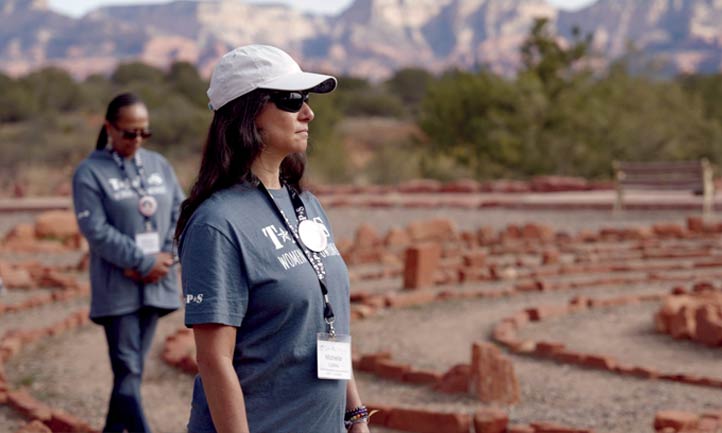
Finding Meaning After Loss
Author and surviving spouse shares what she has learned about grief and herself in life after loss. She now mentors to others new to loss.
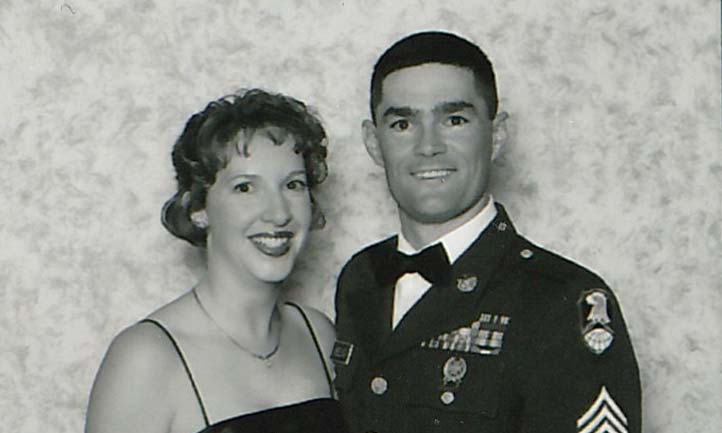
How I Learned to Take Ownership of My Grief
Read out how one survivor learned to stand up for herself and find the path that lead to her own personal healing journey.
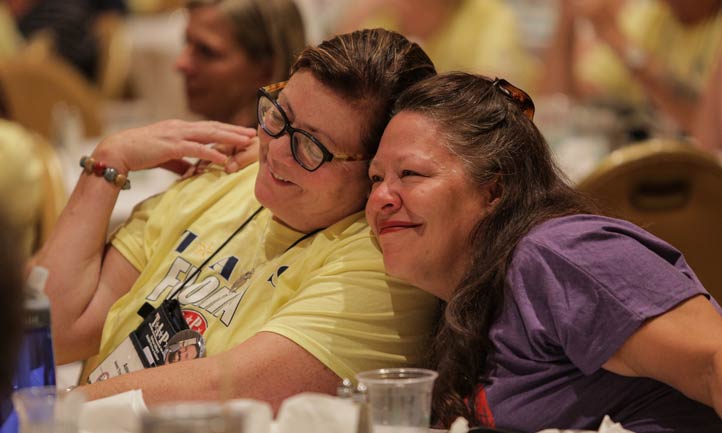
Postvention and Posttraumatic Growth
TAPS helps survivors find a stable, healthy path to healing, allowing them to establish a new life after loss.
« Back
Presented by






